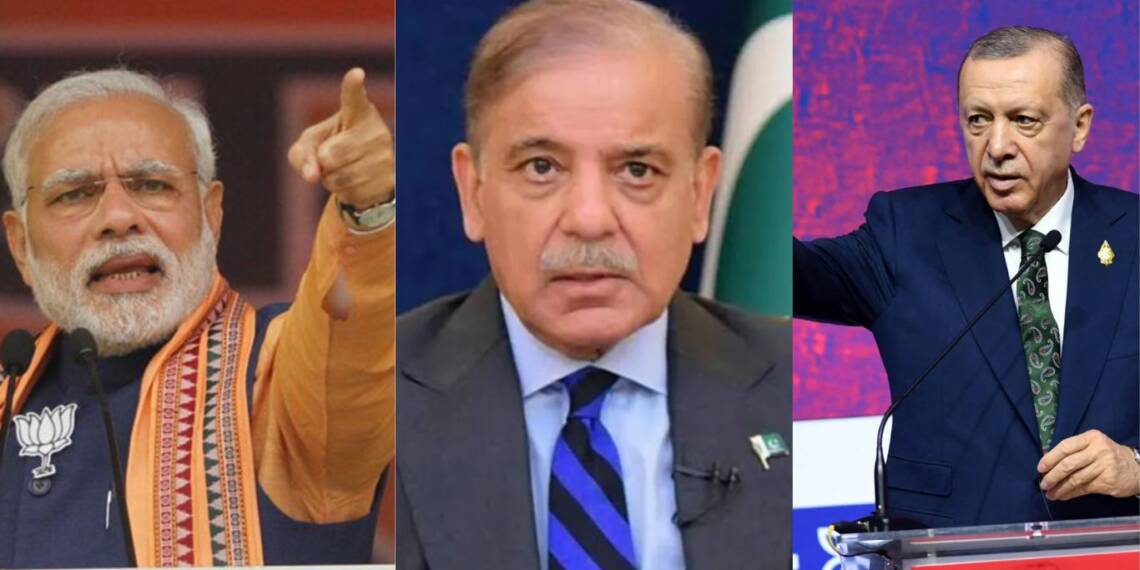On May 8, India experienced a large-scale drone attack along its western borders, stretching from Ladakh to Gujarat. According to Indian authorities, these drones were Turkish-made “Asisguard Songar” models. The precision, coordination, and spread of these attacks indicated military-level planning, and the finger pointed squarely at Pakistan. What makes this attack even more alarming is the likely involvement of Turkish military equipment, raising serious questions about Ankara’s intentions and global responsibilities.
Turkey’s Tilt Towards Pakistan
Turkey’s open support for Pakistan, particularly during moments of conflict with India, is not new, but its scale and timing in this instance have shocked many. Following the drone attack and India’s retaliatory “Operation Sindoor” targeting terrorist camps in Pakistan-occupied Kashmir (PoK), Turkish President Recep Tayyip Erdoğan called Pakistani PM Shehbaz Sharif to express solidarity. At a time when global leaders were condemning terrorism and standing with India after the Pahalgam terror attack, Erdogan was the only world leader openly siding with Pakistan.
Even more troubling, reports suggest that six Turkish military aircraft arrived in Pakistan shortly after the Pahalgam attack—allegedly carrying weapons and other military equipment. While Turkey denied these claims, global flight-tracking systems confirmed the presence of Turkish C-130 military aircraft. Soon after, Turkey also sent a warship, the TCG Bykada, to Karachi, calling it a “routine port call.” These actions indicate military posturing in favour of Pakistan.
A History of Military Partnership
Turkey has rapidly become one of Pakistan’s closest defence partners. From supplying drones like the Bayraktar TB2 and Akinci, to helping Pakistan build advanced naval warships under the MILGEM project, Ankara has played a key role in strengthening Islamabad’s military. Last year alone, Pakistan officially bought over $5 million worth of Turkish arms. But the true scope of their cooperation seems to go far beyond numbers.
This growing defence partnership, especially in the drone warfare domain, is now being turned against India. The May 8 drone swarm that entered Indian airspace was described by the Indian government as an attempt to test India’s air defence systems and gather intelligence—something that wouldn’t be possible without high-end Turkish technology.
Religious Brotherhood Over Humanitarian Values
Why is Turkey so invested in Pakistan? The answer lies partly in ideology. Under President Erdogan, Turkey has shifted from secular Kemalism to a more religiously driven, Pan-Islamist foreign policy. Erdogan often projects himself as a leader of the Muslim world, and Pakistan fits into this vision perfectly. The two countries share cultural, religious, and political affinities—especially in their shared hostility toward India’s position on Kashmir and their alignment against regional powers like Israel.
Turkey has openly backed Pakistan’s narrative on Kashmir, repeating Islamabad’s communal and separatist rhetoric on global platforms. In contrast, Turkey has shown cold indifference toward India, even when India extended a hand of friendship. During the devastating Turkey earthquake, India was one of the first nations to send humanitarian aid (Operation Dost). Yet, in this recent crisis, Turkey has chosen religious solidarity with Pakistan over basic international norms.
Also Read: Why Are Turkish Drones Attacking India Through Pakistan?
Double Standards on Terrorism
It is deeply concerning that while Turkey claims to fight terrorism within its borders, it appears willing to overlook or even indirectly support Pakistan’s state-backed terrorism against India. The Resistance Front, a proxy of Lashkar-e-Taiba, was behind the Pahalgam terror attack that killed innocent Indian tourists. Turkey not only refused to condemn the attack but also stood behind Pakistan after India responded militarily.
President Erdogan described India’s precise strikes on terror camps as the “martyrdom of civilians”—a shocking statement that reflects Turkey’s bias and undermines the global fight against terrorism.
The Need for a Global Wake-Up Call
Turkey’s increasing military and ideological closeness to Pakistan, especially in light of the recent drone attacks on Indian cities, is a matter of grave concern. India must recalibrate its diplomatic approach towards Ankara and alert the international community about the implications of such dangerous alliances.
If global powers truly believe in fighting terrorism, defending civilian lives, and upholding international law, they must hold Turkey accountable for its military support to a nation that sponsors terrorism. Friendship cannot come at the cost of national security, and India has every right to defend its borders and people.
The world must decide that will it stand with nations that sponsor and support terrorism, or with those that combat it?







